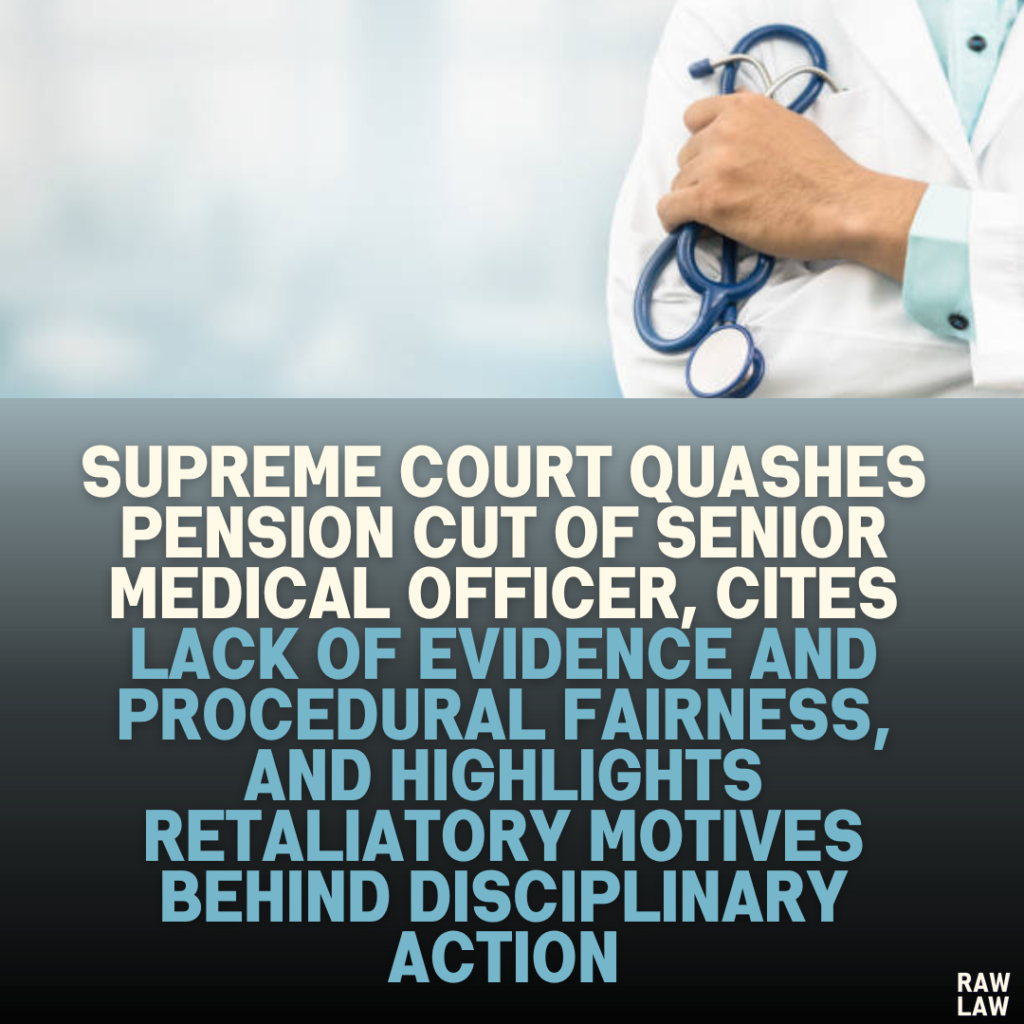Court’s Decision
The Supreme Court quashed the disciplinary authority’s order of a 2% permanent pension cut and the High Court’s modification to a temporary cut for five years. It directed the full restoration of the appellant’s pension, reimbursement of deductions with 6% annual interest, and awarded Rs. 50,000 as costs to the appellant. The Court criticized the actions of the disciplinary authority for procedural unfairness and apparent malice.
Facts
- Background:
- The appellant served as a Senior Medical Officer under the Government of Punjab and was nearing retirement after 34 years of service.
- Eleven days before his retirement (scheduled for March 31, 2017), he was issued a charge sheet alleging misconduct, including unauthorized leave, non-compliance with Election Commission directives, and threats to a subordinate.
- Despite his retirement, disciplinary proceedings were continued, culminating in the imposition of a 2% permanent pension cut.
- Inquiry Findings:
- An inquiry officer concluded that three of four charges were proved, except for the allegation of threatening a senior assistant.
- Legal Proceedings:
- The appellant challenged the disciplinary authority’s decision in the Punjab & Haryana High Court, where a Single Judge dismissed his plea.
- A Division Bench partially modified the punishment, reducing the pension cut to five years, after which the appellant sought relief in the Supreme Court.
Issues
- Was the disciplinary authority’s decision based on sufficient evidence?
- Did the disciplinary proceedings comply with principles of natural justice and procedural fairness?
- Was the punishment proportionate to the alleged misconduct?
- Were the proceedings motivated by malice or improper motives?
Petitioner’s Arguments
- Baseless Allegations: The appellant argued that the charges were fabricated and lacked evidentiary support.
- Malicious Proceedings: He contended that the disciplinary action was initiated as retribution for prior legal actions he pursued against senior officials of the government.
- Violation of Natural Justice: The appellant highlighted procedural irregularities, including a lack of proper communication of leave refusal and reliance on hearsay evidence.
- Disproportionate Punishment: He emphasized his unblemished 34-year service record and argued that the punishment imposed was unduly harsh and arbitrary.
Respondent’s Arguments
- Fair Process: The respondents maintained that the inquiry followed due procedure and afforded the appellant adequate opportunities to present his defense.
- Justified Penalty: They argued that the findings of the inquiry officer and the disciplinary authority were based on evidence and that the penalty was proportionate.
Analysis of the Law
The Court analyzed the disciplinary process under established legal principles:
- Judicial Review of Disciplinary Actions:
- Courts can interfere if disciplinary findings are unsupported by evidence, procedurally unfair, or motivated by extraneous considerations (Union of India v. H.C. Goel).
- Punishment must be proportionate to the misconduct proven, and proceedings must adhere to principles of natural justice (Maneka Gandhi v. Union of India).
- Natural Justice and Procedural Fairness:
- The disciplinary authority’s dismissal of the appellant’s detailed defense with a single sentence violated procedural fairness.
- Reliance on hearsay evidence without corroboration further undermined the inquiry’s credibility.
- Proportionality:
- The Court found no compelling evidence of serious misconduct warranting even a temporary pension cut.
- The appellant’s impending retirement and unblemished service record were ignored in assessing the penalty.
- Election Commission Guidelines:
- The Election Commission’s rules exempted retiring officers from election duties, contradicting the allegations against the appellant.
Precedent Analysis
- Union of India v. H.C. Goel:
- The Court reiterated that disciplinary findings unsupported by evidence are liable to be quashed.
- Maneka Gandhi v. Union of India:
- The constitutionalization of natural justice principles requires procedural fairness in administrative actions.
- Madhyamam Broadcasting Ltd. v. Union of India:
- Judicial review ensures adherence to constitutional principles in disciplinary proceedings.
Court’s Reasoning
- Insufficient Evidence:
- The appellant was charged with unauthorized leave and non-compliance with election and health directives. However, evidence showed that:
- His leave application was acknowledged but not formally rejected.
- He was not assigned election or pulse polio duties.
- The reliance on hearsay testimony and lack of corroborating evidence rendered the findings invalid.
- The appellant was charged with unauthorized leave and non-compliance with election and health directives. However, evidence showed that:
- Procedural Unfairness:
- The disciplinary authority dismissed the appellant’s detailed response with a single sentence, violating principles of fair hearing.
- Malice and Retaliation:
- The timing and nature of the charges suggested a retaliatory motive, as the appellant had previously initiated legal proceedings against senior officials.
- Violation of Election Commission Guidelines:
- The appellant was exempt from election duties as per Election Commission rules, invalidating charges related to non-compliance.
- Disproportionate Punishment:
- The Court noted that even if the charges were proven, the punishment imposed was excessive and disproportionate.
Conclusion
The Supreme Court:
- Quashed the disciplinary authority’s order imposing a pension cut.
- Set aside the High Court’s judgment modifying the penalty.
- Restored the appellant’s full pension with 6% interest on deducted amounts.
- Awarded Rs. 50,000 as costs.
Implications
- Strengthening Natural Justice:
- The judgment reaffirms the need for procedural fairness and adherence to natural justice in disciplinary proceedings.
- Protecting Public Servants:
- It ensures that disciplinary processes are not misused for retaliatory purposes.
- Proportionality in Punishment:
- The ruling emphasizes the importance of proportionality in disciplinary actions, particularly for retiring officers with long service records.
This judgment sets a strong precedent for ensuring fairness and objectivity in disciplinary proceedings, particularly in cases involving senior public servants.



